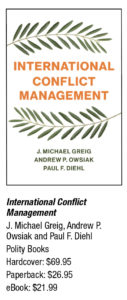 International conflict has long plagued the world, and it continues to do so. With many interstate and civil disputes experiencing no third-party attempts at conflict management, how can the international community mitigate the effects of and ultimately end such violence? Why, in so many cases, are early, “golden opportunities” for conflict management missed?
International conflict has long plagued the world, and it continues to do so. With many interstate and civil disputes experiencing no third-party attempts at conflict management, how can the international community mitigate the effects of and ultimately end such violence? Why, in so many cases, are early, “golden opportunities” for conflict management missed?
International Conflict Management introduces the varied approaches and factors that promote the de-escalation and the peaceful management of conflict across the globe—from negotiation, mediation, arbitration and adjudication to peace operations, sanctions and military or humanitarian intervention.
The history, characteristics and agents of each approach are examined in depth, using a range of case studies to illustrate successes and failures on the ground.
International Conflict Management is co-authored by J. Michael Greig, a professor of political science at the University of North Texas; Andrew P. Owsiak, an associate professor in the international affairs department of UGA’s School of Public and International Affairs; and Paul F. Diehl, the Ashbel Smith Professor of Political Science at the University of Texas.


